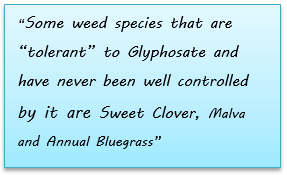
|
|
|
|

|
|||
|
|
|||
|
|
|||
|
We hear a lot about herbicide resistance of weeds to Glyphosate these days and it
is a serious problem. It is important to keep in mind, however, that Glyphosate
does not control all weed species and when weeds are not controlled it is often
a case of “weed tolerance” rather than “weed resistance”.

Some weed species that are “tolerant” to Glyphosate and have never been well controlled by it are Sweet Clover, Malva and Annual Bluegrass. Weeds that are only partially controlled by Glyphosate are Lambsquarters, tumble pigweed, prostrate knotweed, and goosefoot. In general, control of grasses is more inconsistent than control of broadleaf weeds.
Real IPM: Ultimate Spray Rig

To contact Barry Tickes go to: .
|
|||
| Back | |||
|
For questions or comments on any of the topics please contact Marco Pena at the Yuma Agricultural Center.
|
|||
|
Home |
Cotton | Veggies |
Forages | Grains
| Citrus |
Crop x Crop Insects | Diseases| Weeds | Pesticides | Economics | News | Weather | Research | Photos | Contacts | General Info. Copyright © 2001 University of Arizona, College of Agriculture and Life Sciences Webmaster: Al Fournier (acis@ag.arizona.edu) |
|||
